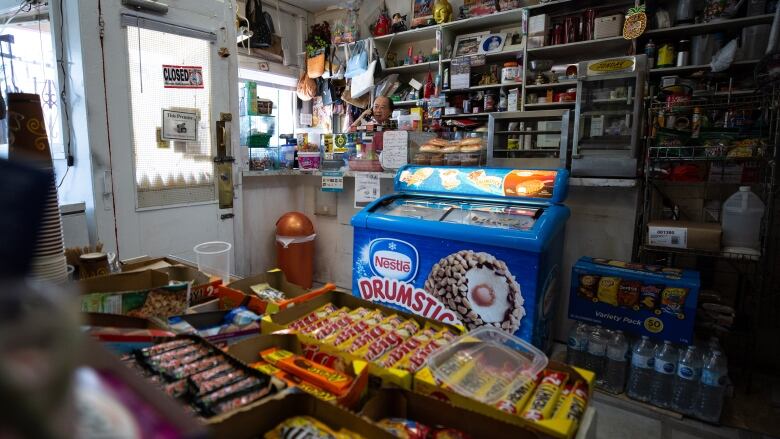Local convenience stores say it hasn't been business as usual during pandemic
Fewer students and downtown office workers mean dipping sales for some

When the majority of public-facing businesses temporarily closed their doors in March to help slow the spread of COVID-19, family owned convenience stores across Waterloo Region kept their "open" signs turned on.
Deemed essential by the provincial government, these little ma and popshops continued to serve their communities with a slew of new challenges.
For Omar Carmona, owner of Oscar's Convenience in downtown Kitchener, this meant rethinking how he staffed his store.
Carmona is a full-time truck driver and his wife works in the store. When schools and daycares closed, Carmona's wife had to stay home with their three young children, leaving Carmona scrambling to find someone else to help in the store. Luckily his aunt and brother-in-law were available to help, but it wasn't an easy fix.
"This is the kind of business where you have to be on top of, in the sense of you [the owner] have to work at the store to make it profitable," Carmona said.
'A frenzy'
Tracy Schneider owns Forwell Super Variety on Lancaster Street in Kitchener. Her dad opened the store 60 years ago and she said this year has been her busiest yet. As closures began across the region in mid-March, Schneider could barely keep items on the shelves.
"It just became a frenzy in here. I guess it was the panic button that was pushed and people came here and just started loading up," Schneider said.
"Every day after that, we just saw double the sales and double our shelves getting empty and a lot of the reason was people did not want to go to the big supermarkets and stand in the outside lines. They knew they could run in and run out of here very quick and easy."
To keep things moving quickly in her store, Schneider doubled up her employees who were used to working alone. This was to make sure there was an extra set of hands in the store to help customers find what they were looking for quickly.
Sales dip as students retreat
Jing Kyung Kim, who owns Neighbour's Market in the student housing district by Wilfrid Laurier University, did not get the same level of foot traffic. While she saw an increase in sales for grocery items, her store's main demographic the students started disappearing as classes moved online and there was no longer a need for them to stay in Waterloo.
"For maybe one or two months, the students stayed here, but after, they went back home, so it was a little bit quiet. It affected my store," Kim said.
Kim has since reduced her store's hours, as those late night snack food sales just aren't there without the students. As September approaches, she is unsure as to how to prepare.
"Usually, around this time, we have to prepare for September, for the new school year, by [stocking] lots of stuff, but now we aren't. Students are not coming back for September, so I don't know how to prepare It's very hard times," Kim said.
Carmona estimates his sales went down between 30 to 50 per cent. Oscar's Convenience is located in the main floor of an apartment building, which has typically brought a lot of consistent regular shoppers to the store, but Carmona soon saw their shopping habits change.
"People got scared, number one. And number two, people started getting really cautious about their spending. Items became luxury, like cigarettes and lotto items like that before, they were buying every day," he said.
Keeping shelves stocked
Carmona also struggled to stock his store. He relies heavily on the larger supermarkets like Food Basics, No Frills and Wholesale, so when those stores began limiting popular items like bread and milk, Carmona found himself waiting in lines all day just to get limited stock of important items he needed in his store.
"Twenty minutes of shopping became three of four hours. I remember lining up at Walmart for an hour and a half just to go in and find that I could only buy two bags of milk. And that was for a [regular] who asked me very kindly to get her a bag of milk," Carmona said.

Schneider experienced similar issues finding stock, but says her sales were so high that running around became worth it. While she did see a decrease in lottery ticket sales, her snack food sales went up. She suspects that was due to peoplespending more nights at home watching movies.
Schneider's store is surrounded by apartment buildings and detached homes and the majority of her regulars are people and families who live close by.
Chris Farrell, manager of the Waterloo Region Small Business Centre, explained the importance of these stores for the neighbourhoods they serve.
"The name says it all convenience. I think their advantage is that they become familiar with the demographics of that neighbourhood and they can introduce products or services specifically for those demographics," Farrell said.
"They really adapt well to the people that are living in their neighbourhood."
Adaptability key
Still, the current pandemic is pushing the limits of adaptability for some stores. For Kim and Neighbour's Market, adapting to serve the student population is only a viable business model if there are students to serve.
With people working from home, staying inside and being wary of excess spending, these convenience stores are not hitting targets like they used to.
Farrell said during the pandemic, people are moving through their cities in different ways and are walking and travelling less than usual.
Stores, especially in the downtown cores, used to rely heavily on foot traffic to bring in business, which worked because that foot traffic was there. But as more and more people work from home, there are fewer office workers taking lunch breaks and fewer people accessing shops by foot.
That means stores located in residential areas, like Forwell Super Variety, are less affected than those in the city cores, like Oscar's Convenience.
Carmona anticipates that Oscar's will soon be up for sale. While this is a loss for both Carmona and those he serves, he remains optimistic.
"Right now, [the best case scenario] will be to find nice people to carry on with the store, to sell the store, and cut my losses because we already lost thousands of dollars," he said.
"I think we are very blessed, because so many businesses won't be able to open at all like that's it, they're done."












_(720p).jpg)


 OFFICIAL HD MUSIC VIDEO.jpg)
.jpg)



























































































